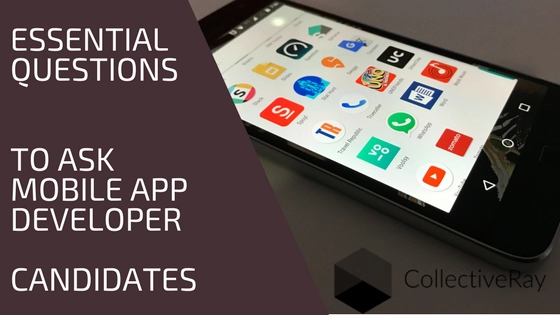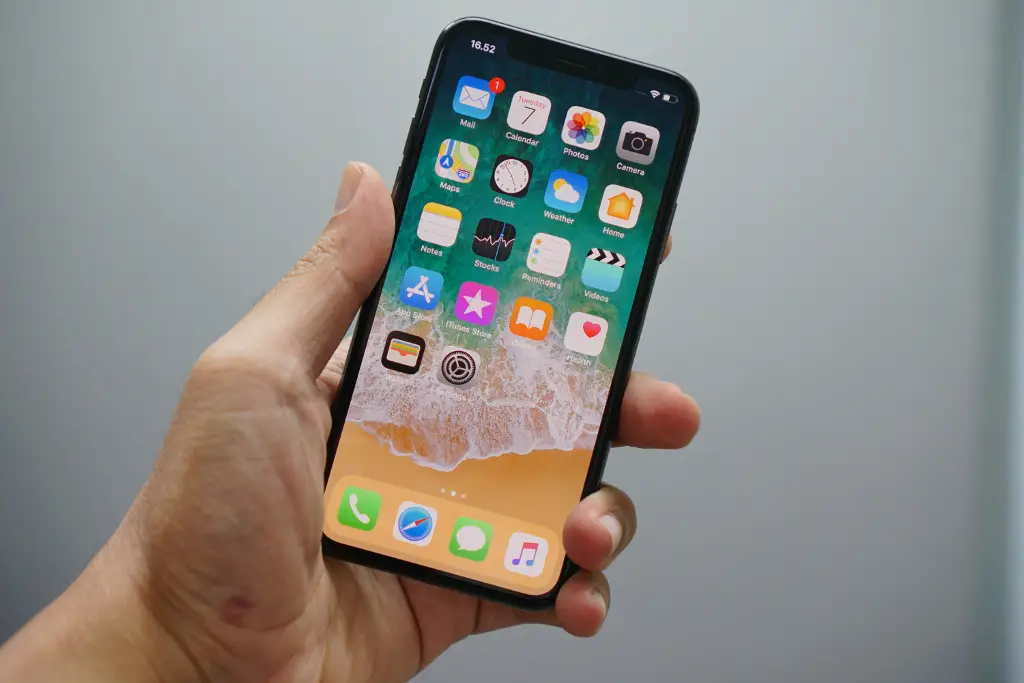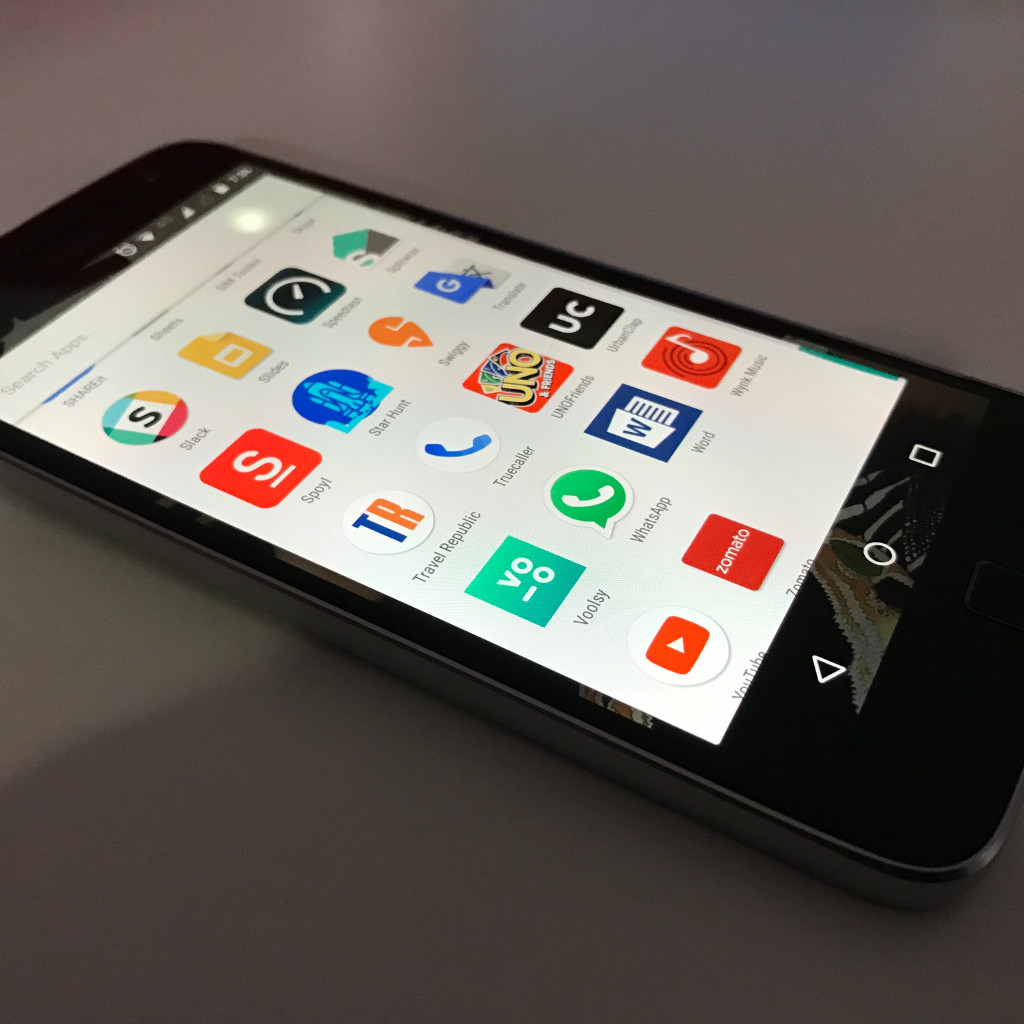
Mobile apps are taking over smartphones. Nowadays, mobile users will rely on apps to learn more about products, and even will fork out money to actually buy apps - provided these give enough value. That’s why many businesses are investing in mobile app development; it’s an opportunity to engage with customers, while selling their product and reaching their target audience.
Developing a mobile app is a huge investment. That’s why large enterprises or entrepreneurs who are launching startups should very carefully consider the candidates they’re looking to hire for the job. Finding the right mobile app developer takes some time, but will be worth the search in the end.
If you’re new to the mobile app world, finding the right person might be difficult if you don’t know what questions to ask. Before you do your research, you should ask yourself the following questions. These are the same questions, we ask, when performing our hiring process.
- What traits should a professional app developers you hire have? If you’re looking at two candidates, how do you determine which is more capable?
- What technologies, languages and platforms are they familiar with? This will have a significant impact on the development process?
- Communication is key. What kind of communication are you looking for? Some developers are very communicative, whereas others will focus their efforts on work.
Thankfully, you don’t have to come up with the right questions on your own because we’ve already done that for you. We want you to ask the right questions in order to get the answers you’re looking for.
Before you start interviewing potential candidates who will build a mobile app you want to launch, take a look at our extensive list. We’ve categorized the questions into different components to give you a well-rounded view of the potential individual you’ll hire. Each of the questions will address different aspects of the mobile app developer’s experience, skills and more.
- Developer Fit: How does the potential developer’s past experience align with what you’re looking for?
- Capabilities: Does the developer have the skillset you need to create the app you want from a functionality and design perspective?
- Process: Will the existing team work on actively communicate with you along the way, and what will that schedule look like?
The following video is a great watch for understanding how to hire great developers.
https://www.youtube.com/watch?v=XYDbq5YfoqI
Mobile app developer interview questions
You’ll be working very closely with this mobile app developer. Your personalities and goals should be aligned. Ask these questions during your in person or virtual video conference interview to find out if this person is right for you and your idea.
1. Can you show me some examples of your previous work?
This is by no means an unreasonable question to ask in any interview. In fact, mobile app developers should be more than willing to provide examples of their previous work.
Test drive the apps they’ve developed in the past. It’ll give you an idea of what they’ve done and if it’s aligned with what you’re asking for.
Mobile app developers should give you a tour of the apps on their phone, or happily provide links to the apps on the App Store or Google Play store. They should go into detail about their involvement and how it directly relates to what you’re looking for.
Not all mobile app developers will have built an app from scratch, but rather worked on different aspects of the app.
They should speak to this experience honestly. If they are not open about their previous work, it may not be the right fit for you. After all, how can you trust someone to invest their effort into building an app if they’re not as experienced as they say?

2. What size companies have you worked with in the past?
If you’re a large enterprise, you might feel more comfort knowing the mobile app developer you want to hire has similar experience.
The same goes for a startup business launching a mobile app. Businesses of different sizes operate very differently. The work atmosphere and culture could be very different from what the mobile app developer is used to, and therefore might not be the best fit.
If the developer has a keen understanding of processes, how paperwork and procedure is managed and budgets, then he or she may be a valuable asset to your team.
3. May I have a list of references?
The best way to learn about a potential candidate is to learn from the past. The same way you would evaluate their previous work by looking at the apps they’ve worked on, you should ask about who their past and current clients are and get in touch with them.
You’ll want to interview the product managers who were in charge of the app in the first place, and ask about how the developer managed the app development and worked with internal teams.
Find out if he or she is reliable, if they actively communicated with you along the way, and if they met deadlines and budget targets.
Listen to what they have to say, and listen to the tone they give away when speaking with them. Are they enthusiastic about discussing previous clients? While a mobile app developer will list clients whom they have a good relationship with, consider asking if there were hurdles or problems along the way. That might give you a more accurate answer.
4. Do you have a strong understanding of my business and its audience?
You can’t expect a mobile app developer to successfully build your app without understanding what it is you do and how the app will make a difference.
A potential candidate won’t have all the answers, but what you can do is take time from the interview process to educate them about your bottom line, your mission and goals for the app. If a developer takes an interest in what you do, it’s a positive sign. More importantly, they should have an interest in using the app itself.
A developer who has worked on apps of similar functionality, or who has clients in the same industry may be a positive fit. They’ll already have an understanding of your business model and will know what it will take to achieve mobile app success.
At the end of the day, you want your mobile app developer to be as heavily invested in the app as you.
This is another great video about hiring developers for apps.
https://www.youtube.com/watch?v=EMIKdqHG-gE&
Next you need to focus on what are the candidate's app development and other capabilities. These mobile app developer interview questions steer the interview in this direction.
5. Do you have experience in building the features I’m looking for?
Before you begin interviewing potential candidates, create a wish list of which features your app must have, and which are nice to have. A list gives your potential mobile app developer an exact idea of what you’re looking for.
Once you have that list, ask the developer what functionalities and features they have experience developing. If your app requires very specific integrations that need to be included, then you’ll need to work with a developer with experience.
An experienced developer may still be capable of learning the functionality building you need; speak with them one-on-one to learn more.
You’ll also have a strong indication if this mobile app developer is right for you based on looking at their portfolio.

6. What about design and user experience?
The features and functionality within the app are going to drive the app’s operations. Having said that, it should also be pleasing to the eye, easy to use from a navigation perspective, and offer a unique experience.
The app you build must stand apart from the rest because there is heavy competition.
You want your app to be memorable.
Mobile app design isn’t as simple as choosing pretty colours and images to use. The right design will make all the difference. Take a close look at the developer’s portfolio to see if creativity has been built into the app, and if the user interface and user experience is something you enjoy.
7. What is the difference between native mobile app design and responsive web design?
Just to be clear, native mobile apps are apps that need to be installed via the Play store or the iOS store, while responsive web design are websites can be accessed through the browser and adapt the look and feel depending on the device which is being used to access the website (e.g. mobile phones will display information differently than desktops).
But one needs to understand that native mobile apps have much richer functionality than websites. This is because native mobile apps are able to access the native functions of the device on which they are running.
Such stuff as built-in notifications, access to the camera, storage, access to information such as contacts, ensures the mobile app has a deeper integration with the device it is installed on. On the other hand, responsive websites only have access to the features which the browser has access to. For security reasons, a browser is sandboxed (or limited in terms of functional access).
This is why native mobile apps are necessary and responsive webs design is not enough.
8. How should one properly design push notifications and are they important?
Push notifications are an extremely powerful tool, but they are a sword that can from both sides. In fact, annoying or too many notifications are the primary reason why people uninstall mobile apps, or disable such notifications (and thus they lose all their effectiveness).
Notifications are powerful because they help you communicate directly with users and deliver timely messages that can prompt actions or engagement.
Your developer needs to understand the implications of using notifications, both their usefulness, when and how to often to send them and measuring their effectiveness or results so that you can adjust depending on how your audience reacts.
9. What are some specific advantages and disadvantages of both Android and iOS?
As a developer working on a mobile app, one needs to understand both the advantages and disadvantages of the different platforms. The developer needs to understand what are the strong points and weak points of both platforms and the nuances of each.
Even such stuff as how long it takes from submission to publication of the app, procedures to get an app listed and ranked and how to resolve any issues that arise with the publication of the app.
Ensure your developer provides detailed examples.
This can become also a bit of a question about the technology stack that the candidate prefers. As a mobile app developer, they will probably have a preferred set of tools/services that they prefer to use, both from a development and a production point of view.
Such a set of services should fit with any technologies your company might already be using.
Read More: Which is better - iPhone or Android?
10. What is onboarding and how will you handle the user onboarding journey?
User onboarding in the context of mobile application is the journey / process of getting the user to successfully start using the app, or product powered by the app.
This might include the installation, registration, activation and taking the first actions that will determine whether a user has adopted the app and/or product.
Given that a lot of effort and money will be going into the marketing of your app, you need to make sure that your developers will take all steps necessary to make sure they don't "lose" a potential user during the onboarding process due to a bad user experience or any technical issues.
Besides the negative experience, there is the loss of LTV revenue of that potential customer.
Your developer needs to have an understanding of such implications and be able to demonstrate an understanding oh what issues might arise and what steps can be taken to mitigate them.
11. How do you handle security issues?
Security is always something that needs to be given due consideration. Your developer needs to understand the security implications of your app. Such stuff as storing of personal information, how payments would be handled, what would happen in the case of a security breach, how to comply with local and national legislation and what levels of compliance would be required etc.
Security is always a very delicate subject especially when talking about mobile devices. Show your knowledge about security and expose your ideas about how to minimize security issues in the app they are creating. Get informed, was there a recent attack to a specific type of software? Mention it and be prepared to explain how you would have solved it.
12. How can you help me make money off my app?
It could take awhile before your mobile app is earning money (after all, have you seen all the free apps on the App store?). It’ll take time for your app to be recognized and widely used by your target audience. Once that happens, you’ll have the authority to charge a small fee for your app.
A mobile app developer should have some understanding of how to monetize a mobile app. There are several ways: in-app advertising, subscriptions, pay per download.
If your app will be free for the first little while, then your developer should have an understanding of mobile advertising networks.
In-app purchases work when an app is smartly designed in a way that will drive purchase conversions. Find out if the developer has experience working with apps that follow this model.

The next section will actually focus on app development per se because this one of the most important parts of the project!
13. How will we be working together?
Communication is a critical component of any project. Since you’ll be working very closely with your mobile app developer, you want to understand how you will be working together (i.e. how often will you be communicating with him or her).
Most developers use project management programs to list task, mark them when they’re completed, and send out progress notifications. Basecamp, Jira and Asana are examples of project management programs that are widely used today.
Ask the developer if they use a program like this. If they do, it’s a solid indication that they know how to keep track of deliverables, use the tool to communicate with key stakeholders, and track the progress every step of the way.
You should also identify how often you’ll want to speak with the developer. Will you schedule a weekly meeting set for a specific time and date?
If the developer is working remotely, will you check in in person every so often, and handle all communication electronically or via teleconferences? Time zones may also be an issue in this case; it’s important to consider before hiring a mobile app developer.
14. What information do you need before you start coding an app?
When you ask this question, the candidate must demonstrate an understanding of the complete life-cycle of the development of an app, rather than just the immediate requirements.
Hearing most of the following will indicate that the mobile app developer being interviewed has a good understanding of all the stages of the development of a mobile app.
- Detailed purpose of the app for the app publisher
- Description of the target audience, various "personas" and/or user demographics
- Any existing apps that implement a similar concept
- Wireframes and designs of the look and feel
- Final Artwork - a good developer should require the final artwork before they start developing to ensure no doubling of effort is done.
15. How will you handle app testing?
More important than the actual development of an app is the testing itself. You don’t want to launch an app that hasn’t been thoroughly tested. Bugs and problems with features can happen, but should only happen during the testing period.
A mobile app developer should handle all of the testing and employ methodologies that tracks all features, establishes that they have all been implemented, and are in working order. Testing should be conducted during and after mobile app development.
It’s important to seek outside help in mobile app testing. You and a mobile app developer will have been working on the same project for a while, therefore may be unable to identify flaws or drawbacks. Consider seeking an outsider’s point of view.

16. Will you submit my mobile app to the appropriate app stores, and under which name will it be published?
Once an app has been developed and is thoroughly tested, it’s time to launch. Your iOS developers for example should have experience submitting the app to various the Apple app store and other major platforms.
The submission process is a long one, and it can be frustrating. Your developer should know how the process works and guide you along the way.
The app should be submitted under your name, not under your mobile app developer’s name. The app store must know who is responsible for the app in the event that you are no longer in communication with the mobile app developer you hired. Without it, new versions of the app cannot be submitted to the store, and you’ll be forced to release a brand new app under a different account or name.
17. How will maintenance of the app work?
Remember we mentioned the part about not being in communication with your mobile app developer? If all goes well, you will have hired a professional mobile app developer with whom you can establish a professional working relationship. More importantly, they will be there for you long after the app is sent to the app store.
Keeping users engaged, keeping up with bug fixes and updating app versions is part of the maintenance process. No one knows the ins and outs of your app better than your mobile app developer.
Ask them how maintenance support programs are structured, and how they will address changes to the app as needed. Also, find out how much it costs. Most developers will charge by the hour.
18. What is your position with regards to PWAs?
PWAs or Progressive Web Applications are a hybrid concept between websites and native mobile applications. The developer needs to demonstrate and understanding of how to eventually enable the release of a PWA, that reuses some of the functionality of the website and mobile apps, WITHOUT rewriting everything from scratch.
This means that they should understand the concept of having the PWA and/or native mobile apps, working with the backends or infrastructure powering a website and/or product in a similar way, where the mobile app or any other device is actually just a "skin" - the real work is being done at the backend.
Read more: iPhone Models in Order of Release
Conclusion
Mobile apps are a strong tool to leverage in today’s digital world. They keep customers engaged and may even drive more sales. The difficulty lies in hiring the right mobile app developer for your project. Take the time to interview them thoroughly, as the right questions, and find out if the fee structure is a good fit for your business.
